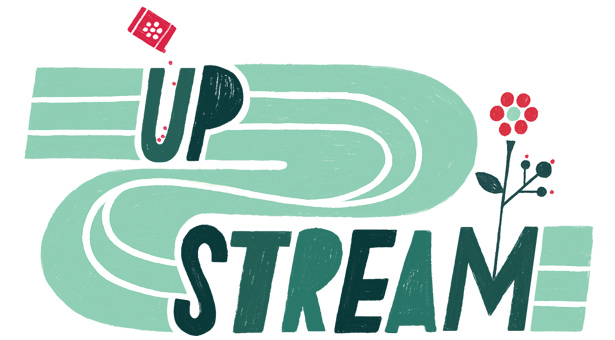Word Play What's in a Word
We don’t know about you, but we love to learn about words — their meanings, their origins, and how they shape our world. In each issue of Response, we ask a campus expert to explore a word related to the magazine’s theme.

By Margaret Diddams, Professor of Industrial/Organizational Psychology, Assistant Provost, and Director of the Center for Scholaship and Faculty Development | Illustration by Livy Long
 There is a parable that is often told among those who work to eliminate human trafficking. Two people are fishing in an eddy of a fast-moving river, when they are
startled to see masses of people being swept past them in the current. They frantically struggle to
pull out as many as possible but soon realize that their task is hopeless. One yells that they must
go upstream to find where and why people are being thrown in to stop the source of this tragedy.
There is a parable that is often told among those who work to eliminate human trafficking. Two people are fishing in an eddy of a fast-moving river, when they are
startled to see masses of people being swept past them in the current. They frantically struggle to
pull out as many as possible but soon realize that their task is hopeless. One yells that they must
go upstream to find where and why people are being thrown in to stop the source of this tragedy.
It is easy to draw the parallels between this analogy and the work of modern abolitionists. Rescuing people once they have been coerced into providing their labor or bodies against their will is difficult work, requiring the talents of skilled personnel at organizations such as International Justice Mission or local agencies such as REST (Real Escape from the Sex Trade) or the Refugee Women’s Alliance. Yet there is such a desire to be part of this movement to free the millions trapped in bondage. Students want to know how they can get involved — right now.
Go upstream, I tell them. Start by reducing demand. Know the types of products that are produced by slave labor and those companies who have publicly taken a stand to refuse to use slave labor. Be a voice against the flood of pornography. Reduce the vulnerabilities associated with poverty by volunteering at a food bank, a women’s shelter, or other work with the homeless. Be a big brother or sister, or get involved with foster care programs in your area.
Most importantly, reduce poverty. Partner with existing organizations through strategic funding. Important areas include markets for microfinance-funded goods and agricultural products, reforestation projects, legal aid, and educational, vocational, and entrepreneurial opportunities for young women and men.
By working upstream, we not only reduce the likelihood of people being trapped into slavery, but more importantly we also increase human flourishing, allowing people to live into the promise of God’s good and redeemed creation.
Margaret Diddams taught a University Seminar course on “Human Trafficking and the Modern Abolitionist Movement” during Autumn Quarter 2014 and will teach it again this autumn.
